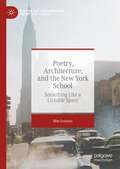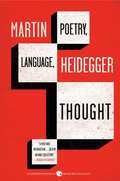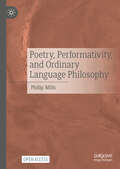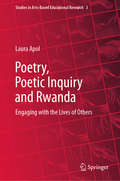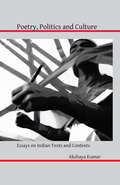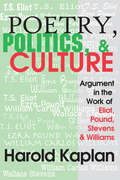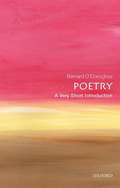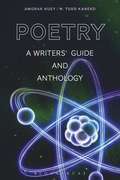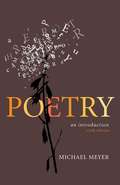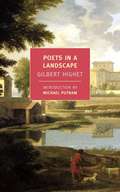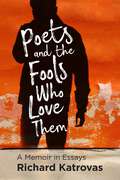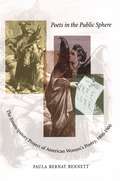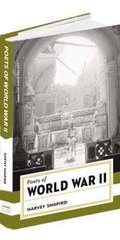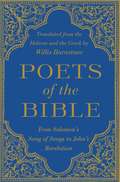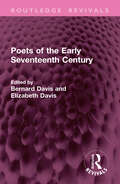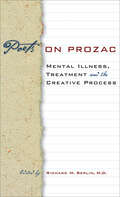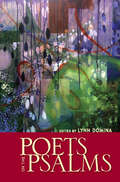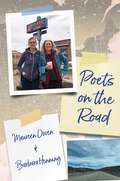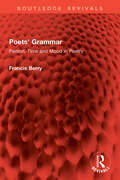- Table View
- List View
Poetry, Architecture, and the New York School: Something Like a Liveable Space (Modern and Contemporary Poetry and Poetics)
by Mae LosassoPoetry, Architecture, and the New York School: Something Like a Liveable Space examines the relationship between poetics and architecture in the work of the first generation New York School poets, Frank O’Hara, John Ashbery, Barbara Guest, and James Schuyler. Reappraising the much-debated New York School label, Mae Losasso shows how these writers constructed poetic spaces, structures, surfaces, and apertures, and sought to figure themselves and their readers in relation to these architextual sites. In doing so, Losasso reveals how the built environment shapes the poetic imagination and how, in turn, poetry alters the way we read and inhabit architectural space. Animated by archival research and architectural photographs, Poetry, Architecture, and the New York School marks a decisive interdisciplinary turn in New York School studies, and offers new frameworks for thinking about postmodern American poetry in the twenty-first century.
Poetry, Language, Thought (Harper Perennial Modern Thought Ser.)
by Martin HeideggerPoetry, Language, Thought collects Martin Heidegger's pivotal writings on art, its role in human life and culture, and its relationship to thinking and truth. Essential reading for students and anyone interested in the great philosophers, this book opens up appreciation of Heidegger beyond the study of philosophy to the reaches of poetry and our fundamental relationship to the world. Featuring "The Origin of the Work of Art," a milestone in Heidegger's canon, this enduring volume provides potent, accessible entry to one of the most brilliant thinkers of modern times.
Poetry, Modernism, and an Imperfect World
by Sean PryorDiverse modernist poems, far from advertising a capacity to prefigure utopia or save society, understand themselves to be complicit in the unhappiness and injustice of an imperfect or fallen world. Combining analysis of technical devices and aesthetic values with broader accounts of contemporary critical debates, social contexts, and political history, this book offers a formalist argument about how these poems understand themselves and their situation, and a historicist argument about the meanings of their forms. The poetry of the canonical modernists T. S. Eliot, Mina Loy, and Wallace Stevens is placed alongside the poetry of Ford Madox Ford, better known for his novels and his criticism, and the poetry of Joseph Macleod, whose work has been largely forgotten. Focusing on the years from 1914 to 1930, the book offers a new account of a crucial moment in the history of British and American modernism.
Poetry, Performativity, and Ordinary Language Philosophy
by Philip MillsHow can Ordinary Language Philosophy (OLP) help us understand poetry? Against John L. Austin’s exclusion of poetic utterances as parasitical, Philip Mills explores how contemporary poetics broadens the aims and scope of OLP. Through the analysis of French and American poetry that reinterprets notions such as illocution, perlocution, and language-games, Mills develops a poetic philosophy of language, revealing its viral and transformative nature. Poetry, Performativity, and Ordinary Language Philosophy bridges philosophy and poetry, showing how poetry contaminates and reshapes our ways of thinking and being in the world, and combining the poetic and the ethical in the notion of ‘poethics.’ This Open Access book offers a new perspective on the poetic and literary potential of OLP and the intersections between the philosophy of language and poetry.
Poetry, Physics, and Painting in Twentieth-Century Spain
by Candelas GalaThis book reads the work of Salinas, Guill#65533;n, Larrea, Diego, Alberti, M#65533;ndez, and Lorca in analogical relation with Cubism and with the revolutionary discoveries of modern physics. Gala advances traditional criticism by considering these artists in the broader cultural context of Spain, Europe, and European Modernism.
Poetry, Poetic Inquiry and Rwanda: Engaging with the Lives of Others (Studies in Arts-Based Educational Research #3)
by Laura ApolThis book describes the practice of poetic inquiry and takes the reader through the process of translating lived experience into poetry that attends to the lives of others. Using her own writing—from early drafts to published poems—Apol demonstrates elements of poetic inquiry that both give it strength and make it complicated: the importance of craft (the aesthetic); the imperative of accuracy and reliability (the investigative); the significance of ethical responsibility that leads to action (witness); and the centrality of relational connectedness and accountability (withness). Apol raises questions about what it means for poems to function as both research and art, and illustrates what happens when there are irresolvable conflicts between the demands of the poem and a commitment to relationship. Throughout, Apol addresses her white privilege, as well as the dominant white/colonial narrative that often seeps into arts-based work unless it is overtly and critically addressed. The book goes beyond arts-based research, speaking as well to other forms of cross-national, cross-cultural research. It is a call for relational scholarship that moves toward action, a heart-rending teaching, a post-traumatic aesthetic map laid down with clear and poignant theory and praxis to extend, serve and guide.
Poetry, Politics and Culture: Essays on Indian Texts and Contexts
by Akshaya KumarThis book maps the journey of the Indian poetic imagination—in Hindi, Panjabi and Indian English—from its original quasi-spiritual longings to its activist interventions in the public domain. As Indian poetry of the post-1990s gravitates towards a non-Orientalised postcolonial nationalism, it seeks to rewrite and disseminate the shifting coordinates of nationalist imagination in terms of the dissent of the subaltern discontents of the nation. The book is interdisciplinary: it studies Indian poetry from the new emerging imperatives of postcolonialism, new historiography (subaltern, dalit and diasporas), nationalism, and cultural studies. Covering the two major north Indian languages—Hindi and Punjabi—along with poetry in Indian English, the book is a close textual study of about 150 poetry collections in these languages. It is path-breaking in its study of secular poetry written in the so-called vernaculars, with critical attention to its participation in the political as well as cultural processes of nation-making. This cutting-edge book should be of interest to scholars of Indian writings in English, Hindi and Panjabi, gender studies, dalit and diaspora studies, postcolonial poetry and to students reading South Asian literature and culture.
Poetry, Politics, and Culture: Argument in the Work of Eliot, Pound, Stevens, and Williams
by Harold KaplanA salient feature of modern poetics is its direct connection with cultural history and politics. Among the great American poets of the twentieth century, Wallace Stevens and William Carlos Williams offer a significant contrast with T. S. Eliot and Ezra Pound. Where the latter advocated a theocentric or reactionary response to the cultural crises of modernity, the former affirmed an essentially humanist and democratic social and aesthetic ethos. In Poetry, Politics, and Culture, Harold Kaplan offers a penetrating comparative study of these representative and distinctively influential poets.All four poets wrote in an atmosphere of cultural crisis following World War I, caught as they were between outmoded belief systems and various forms of artistic and political nihilism. While each believed in poetry as a source of cultural values and beliefs, they nevertheless experienced loss of confidence in their own vocation in a world characterized by scientific, rationalist thinking and the mundane struggle for survival. For each, therefore, the poetic imagination was a means of restoring order, or building a new civilization out of chaos. In trying to define a revitalized culture, the four exemplified the perennial quarrel between Europe and America.
Poetry: A Very Short Introduction (Very Short Introductions)
by Bernard O'DonoghueIn this book, the author provides a fascinating look at the many different forms of writing which have been called "poetry" - from the Greeks to the present day. As well as questioning what poetry is, he asks what poetry is for, and considers contemporary debates on its value.
Poetry: A Writers' guide and Anthology
by Amorak Huey W. Todd KanekoThe authors map out more than 25 key elements of poetry including image, lyric, point of view, metaphor, and movement and use these elements as starting points for discussion questions and writing prompts. The book guides the reader through a range of poetic modes including: Elegy, Found poems, Nocturne, Ode, Protest poems, Ars Poetica, Lyric, Narrative Poetry also offers inspiring examples of contemporary poetry covering all the modes and elements discussed by the book.
Poetry: An Introduction (6th Edition)
by Michael MeyerFlexible enough for any poetry course, this text is designed to make your students lifelong lovers of poetry. It combines classic poetry with today's hippest verse, mixing in delicious portions of contemporary life, humor, and universal themes. In-depth chapters on authors such as Emily Dickinson and Billy Collins reveal the real-life contexts in which poets create. There is also plenty of support for students -- with thorough chapters on the poetic elements, six sensible chapters on critical reading and writing, and many helpful sample close readings, writing assignments, and student papers.
Poets In A Landscape
by Gilbert HighetGilbert Highet was a legendary teacher at Columbia University, admired both for his scholarship and his charisma as a lecturer. Poets in a Landscape is his delightful exploration of Latin literature and the Italian landscape. As Highet writes in his introduction, “I have endeavored to recall some of the greatest Roman poets by describing the places were they lived, recreating their characters and evoking the essence of their work. ” The poets are Catullus, Vergil, Propertius, Horace, Tibullus, Ovid, and Juvenal. Highet brings them life, setting them in their historical context and locating them in the physical world, while also offering crisp modern translations of the poets’ finest work. The result is an entirely sui generis amalgam of travel writing, biography, criticism, and pure poetry—altogether an unexcelled introduction to the world of the classics.
Poets Of Reality: Six Twentieth-Century Writers
by J. Hillis MillerPassages from six twentieth century authors: Joseph Conrad, W.B. Yeats, T. S. Eliot, Dylan Thomas, Wallace Stevens, William Carlos Williams
Poets Thinking: Pope, Whitman, Dickinson, Yeats
by Helen VendlerPoetry has often been considered an irrational genre, more expressive than logical, more meditative than given to coherent argument. And yet, in each of the four very different poets she considers here, Helen Vendler reveals a style of thinking in operation; although they may prefer different means, she argues, all poets of any value are thinkers. The four poets taken up in this volume--Alexander Pope, Walt Whitman, Emily Dickinson, and William Butler Yeats--come from three centuries and three nations, and their styles of thinking are characteristically idiosyncratic. Vendler shows us Pope performing as a satiric miniaturizer, remaking in verse the form of the essay, Whitman writing as a poet of repetitive insistence for whom thinking must be followed by rethinking, Dickinson experimenting with plot to characterize life's unfolding, and Yeats thinking in images, using montage in lieu of argument. With customary lucidity and spirit, Vendler traces through these poets' lines to find evidence of thought in lyric, the silent stylistic measures representing changes of mind, the condensed power of poetic thinking. Her work argues against the reduction of poetry to its (frequently well-worn) themes and demonstrates, instead, that there is always in admirable poetry a strenuous process of thinking, evident in an evolving style--however ancient the theme--that is powerful and original.
Poets and the Fools Who Love Them: A Memoir in Essays
by Richard KatrovasPoets and the Fools Who Love Them blends autobiography with cultural commentary and meditates on creative writing as a cottage industry within humanities higher education. Celebrated poet and memoirist Richard Katrovas examines his picaresque early years with a criminal father, a beleaguered mother, and four siblings as state and federal authorities pursued the family across the highways of America. His freewheeling, wide-ranging essays consider, among other social constructs, the relation of crime and art, and the relation of both to the authority of the state, particularly in terms of race and class. Katrovas speaks candidly about how white privilege facilitated his father’s criminal career, as a lifestyle of larceny and used-car scams, perpetuated state to state, would have surely had different implications for a family of color. Drawing on his adulthood in academe, Katrovas’s memoir in essays chronicles a quest to locate surrogate fathers among older poets and other creative writers, and reflects upon the ways in which that search has affected his role as the father to three Czech American daughters. The book flows from the love of a poet for other poets, for the “community of poets,” one likened to a “gang of priests” and a “herd of bears.” Katrovas maintains that most lovers of poets are themselves poets, and those lovers of poets who are not themselves poets are saints.At its heart, Poets and the Fools Who Love Them contemplates, with care and unabashed honesty, the role of art and the artist in the madcap twenty-first century.
Poets in the Public Sphere: The Emancipatory Project of American Women's Poetry, 1800-1900
by Paula Bernat BennettBased entirely on archival research, Poets in the Public Sphere traces the emergence of the "New Woman" by examining poetry published by American women in newspapers and magazines between 1800 and 1900. Using sources like the Kentucky Reporter, the Cherokee Phoenix, the Cincinnati Israelite, and the Atlantic Monthly, Bennett is able to track how U.S. women from every race, class, caste, region, and religion exploited the freedom offered by the nation's periodical press, especially the poetry columns, to engage in heated debate with each other and with men over matters of mutual concern. Far from restricting their poems to the domestic and personal, these women addressed a significant array of political issues--abolition, Indian removals, economic and racial injustice, the Civil War, and, not least, their own changing status as civil subjects. Overflowing with a wealth of heretofore untapped information, their poems demonstrate conclusively that "ordinary" nineteenth-century women were far more influenced by the women's rights movement than historians have allowed. In showing how these women turned the sentimental and ideologically saturated conventions of the period's verse to their own ends, Bennett argues passionately and persuasively for poetry's power as cultural and political discourse. As much women's history as literary history, this book invites readers to rethink not only the role that nineteenth-century women played in their own emancipation but the role that poetry plays in cultural life.
Poets of World War II
by Harvey ShapiroAcclaimed poet and World War II veteran Harvey Shapiro's pathbreaking gathering of work by more than sixty poets of the war years includes Randall Jarrell, Anthony Hecht, George Oppen, Richard Eberhart, William Bronk, and Woody Guthrie.
Poets of the Bible: From Solomon's Song of Songs to John's Revelation
by Willis Barnstone“The vividness and beauty of the language emerge in a fresh way . . . with evocative simplicity.” —Robert Alter, professor emeritus of Hebrew and comparative literature, University of California, Berkeley The world’s greatest poetry resides in the Bible, yet these major poets are traditionally rendered into prose. In this pioneering volume of biblical poets translated in English, Willis Barnstone restores the lyricism and power of the poets’ voices in both the New and Old Testaments. In the Hebrew Bible we hear Solomon rhapsodize in Song of Songs, David chant in Psalms, God and Job debate in grand rhetoric, and prophet poet Isaiah plead for peace. Jesus speaks in wisdom verse in the Gospel, Paul is a philosopher of love, and John of Patmos roars majestically in Revelation, the Bible’s epic poem. This groundbreaking volume includes every major biblical poem from Genesis and Adam and Eve in the Garden to the last pages of Alpha and Omega in Paradise.
Poets of the Early Seventeenth Century (Routledge Revivals)
by Elizabeth Davis Bernard DavisFirst published in 1967, Poets of the Early Seventeenth Century is a representative selection of shorter poems written during the first half of the seventeenth century by principal poets of this period. Of these poets, only Ben Jonson in the strict sense was a professional author, writing as a means of livelihood. Milton and probably Browne at this stage of their careers, were independent. The others pursue different professions, as courtiers, diplomats, tutors, clerics, and in case of Vaughan, as a physician. Most of these poems were probably fruits of their writers’ leisure hours and some at least were intended rather for private circulation than for early publication.The editors have added brief critical comments on each poet and biographies in the notes and this book is a must read for students of English literature and English poetry.
Poets on Prozac: Mental Illness, Treatment and the Creative Process
by Richard M. BerlinIn this collection of 16 essays, poets discuss psychiatric treatment and their work. Poets on Prozac shatters the notion that madness fuels creativity by giving voice to contemporary poets who have battled myriad psychiatric disorders, including depression, schizophrenia, post-traumatic stress disorder, and substance abuse.The sixteen essays collected here address many provocative questions: Does emotional distress inspire great work? Is artistry enhanced or diminished by mental illness? What effect does substance abuse have on esthetic vision? Do psychoactive medications impinge on ingenuity? Can treatment enhance inherent talents, or does relieving emotional pain shut off the creative process?Featuring examples of each contributor’s poetry before, during, and after treatment, this original and thoughtful collection finally puts to rest the idea that a tortured soul is one’s finest muse.Honorable Mention, 2008 PROSE Award for Best Book in Psychology.“A fascinating collection of 16 essays, as insightful as they are compulsively readable. Each is honest and sharply written, covering a range of issues (depression, anxiety, obsessive-compulsive disorder, psychosis, substance abuse or, in acutely deadpan Andrew Hudgins’s case, “tics, twitches, allergies, tooth-grinding, acid reflux, migraines . . . and shingles”) along with treatment methods, incorporating personal anecdotes and excerpts from poems and journals. . . . Anyone affected by mental illness or intrigued by the question of its role in the arts should find this volume absorbing.” —Publishers Weekly“Berlin has done a marvelous job of showing us how ordinary poets are; the selected poets have shown us that mental illness shares with other experiences a capacity to reveal our humanity.” —Metapsychology
Poets on Prozac: Mental Illness, Treatment, and the Creative Process
by Richard M. BerlinHonorable Mention, 2008 PROSE Award for Best Book in Psychology. Professional and Scholarly Publishing Division of the Association of American Publishers.Poets on Prozac shatters the notion that madness fuels creativity by giving voice to contemporary poets who have battled myriad psychiatric disorders, including depression, schizophrenia, post-traumatic stress disorder, and substance abuse.The sixteen essays collected here address many provocative questions: Does emotional distress inspire great work? Is artistry enhanced or diminished by mental illness? What effect does substance abuse have on esthetic vision? Do psychoactive medications impinge on ingenuity? Can treatment enhance inherent talents, or does relieving emotional pain shut off the creative process?Featuring examples of each contributor’s poetry before, during, and after treatment, this original and thoughtful collection finally puts to rest the idea that a tortured soul is one’s finest muse.
Poets on the Psalms
by Lynn DominaReverential, celebratory, antagonistic, and even erotic, this remarkable collection of essays interprets the Psalms as a collection of poetry. Written by 14 acclaimed poets, the essays approach the Psalms from a personal, often autobiographical perspective, demonstrating how relevant they remain for today's readers. Alicia Ostriker examines the Psalms' glory and their terror in a moving essay that revels in their moods of joy while acknowledging the brutality they invoke, linking their violence to events such as 9/11, the Palestinian uprisings, and the Rwandan massacres. Weaving autobiographical anecdotes with scholarly introspection, Enid Dame provides a Jewish explanation of Psalm 22, while editor Lynn Domina contemplates the pastoral life as she connects the everyday with phrases from the Psalms. From a former nun to a self-described left-wing Jew, from a Midrashic scholar to a Texas rancher, the contributors mirror the wide swath of humanity interested in, and affected by, the Psalms.
Poets on the Psalms
by Lynn DominaReverential, celebratory, antagonistic, and even erotic, this remarkable collection of essays interprets the Psalms as a collection of poetry. Written by 14 acclaimed poets, the essays approach the Psalms from a personal, often autobiographical perspective, demonstrating how relevant they remain for today's readers. Alicia Ostriker examines the Psalms' glory and their terror in a moving essay that revels in their moods of joy while acknowledging the brutality they invoke, linking their violence to events such as 9/11, the Palestinian uprisings, and the Rwandan massacres. Weaving autobiographical anecdotes with scholarly introspection, Enid Dame provides a Jewish explanation of Psalm 22, while editor Lynn Domina contemplates the pastoral life as she connects the everyday with phrases from the Psalms. From a former nun to a self-described left-wing Jew, from a Midrashic scholar to a Texas rancher, the contributors mirror the wide swath of humanity interested in, and affected by, the Psalms.
Poets on the Road
by Maureen Owen Barbara HenningCalling to mind Basho¯&’s late life journeys through the backcountry of Japan, two women poets in a well-worn Honda hit the road for a legendary pilgrimage in a far-flung (pre-pandemic) landscape of American poetry.Although a road trip across North American calls to mind Jack Kerouac&’s youthful meanderings of self-discovery, this reading tour was more in the manner of Basho¯&’s late life journeys through the backcountry of Japan. . . . The road trip was in a sense a pilgrimage of reengagement with their calling as poets, and a chance to reacquaint with like-minded friends, old and new, in a far-flung landscape of American poetry. Venues would include upscale bookstores, coffee houses, museums, legendary used bookstores, botanical gardens, university classrooms, art centers, and artist coops—in short, a unique sampling of poetry environments tracing an arc across the Southern States, the Southwest, and up the West Coast before hooking back to the Rockies. Framed as a personal challenge, the poets hit the road much in the manner of itinerant preachers and musicians, lodging at discount motels, funky hostels, Airbnbs, and with friends along the way. Adding a social media touch, Maureen and Barbara created a blog of their tour so that friends, family, hosts, and fellow poets might also share in their adventure. —from the Introduction by Pat Nolan
Poets' Grammar: Person, Time and Mood in Poetry (Routledge Revivals)
by Francis Berry dec'dFirst published in 1958, Poets’ Grammar treats of a few grammatical forms and inflexions as they function in the work of some English poets and dramatists. For this purpose, the author is less concerned with the primary meaning of the word Grammar, as given by Shorter Oxford Dictionary, namely “that department of the study of language which deals with its inflexional forms or their equivalents with the rules for employing these correctly”, than with that subordinate meaning of the word, as defined by the same dictionary, namely “an individual's manner of using grammatical forms.”The book discusses important themes like tense in medieval pageant and poem; pronoun and verb in Shakespeare; Elizabethan and Jacobean ‘personal’ insights; Shelley and the future tense; and preposition in poetry and translation. This is an interesting read for scholars and students of English literature and English poetry.
